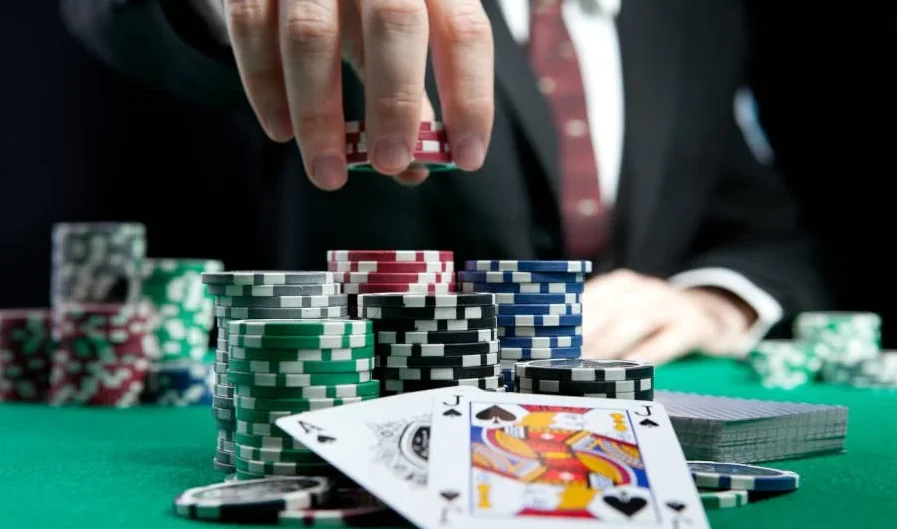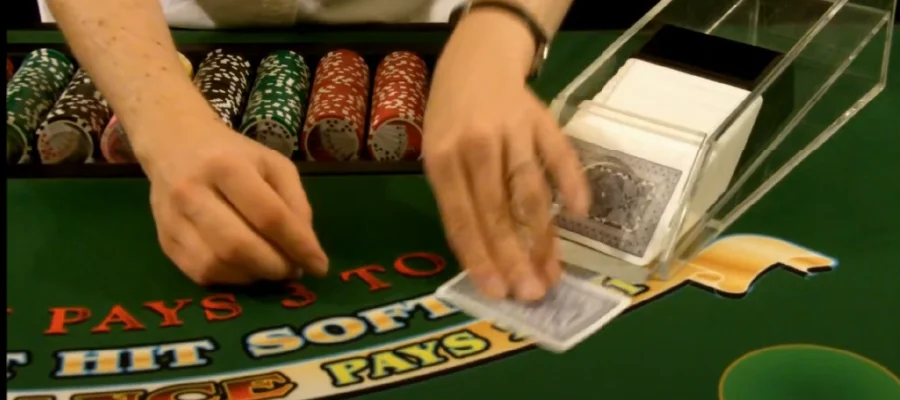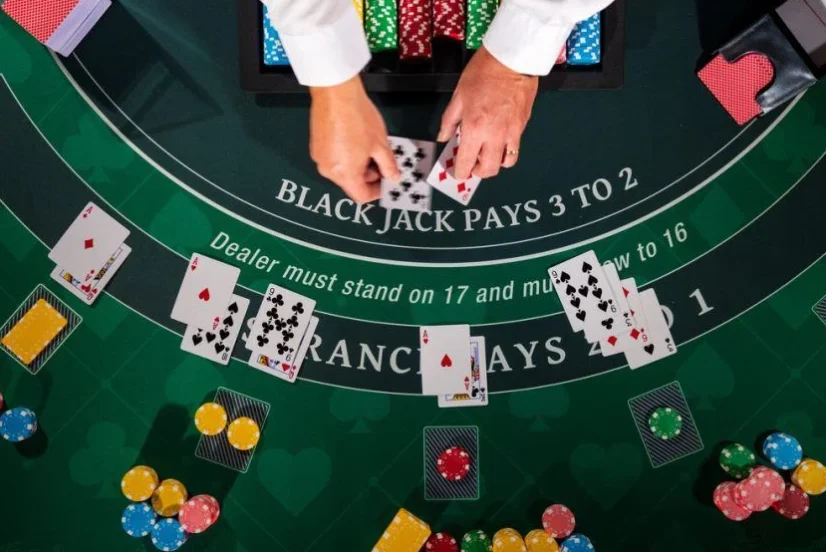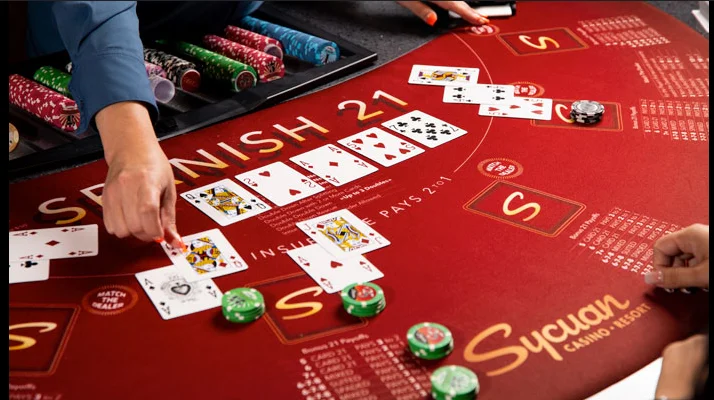Learning how to deal blackjack is one of the most important skills for anyone hosting a game or working in a casino. A good dealer keeps the game fair, fast, and smooth while managing cards, bets, and player actions with confidence.
In this guide, you’ll learn the full process from shuffling the deck to settling bets. Whether you’re dealing at home or training for the casino floor, this step-by-step breakdown will help you do it right.
In the article
- 1 How to Deal Blackjack: What Does a Dealer Do?
- 2 How to Deal Blackjack Step-by-Step
- 3 Blackjack Dealer Rules You Need to Know
- 4 Common Card Handling Techniques
- 5 Blackjack Payout Rules
- 6 How to Deal Blackjack in Different Variants
- 7 How to Become a Blackjack Dealer
- 8 What Blackjack Dealers Make
- 9 Final Tips for Dealing Blackjack Smoothly
- 10 Conclusion – Why You Must Know how to Deal Blackjack
How to Deal Blackjack: What Does a Dealer Do?
Blackjack is a popular gambling game and casino card game, known for its rich history and widespread appeal in both casinos and home gambling games. A blackjack dealer manages every part of the game, from shuffling cards and taking bets to dealing hands and paying out winners. In both casinos and home gambling games, the dealer keeps the game fair, fast, and organized.
Good dealing prevents disputes, maintains trust, and ensures that house rules are followed exactly. A confident, consistent dealer also creates a smoother experience for everyone at the table.
How to Deal Blackjack Step-by-Step
Dealing blackjack correctly means following a clear sequence while managing cards, bets, and player decisions. The steps below apply to home games, casinos, and even live blackjack casinos, where real dealers operate via livestream.
Step 1: Shuffle and Prepare the Deck
Start by shuffling all the the cards thoroughly to ensure fairness and randomness. In most games, 1 to 8 decks are used. Place the cut card where required, then insert the deck into the shoe or prepare it for hand dealing. Proper shuffling prevents card tracking and ensures fairness, just as it would in online casinos using digital random number generators.
Step 2: Take Player Bets
Before any cards are dealt, players place their bets on the betting circle using chips. The initial bet is the first wager placed by each player and should be confirmed to be within table limits before locking in. No more changes are allowed once the first card is dealt.
During the round, players may have the opportunity to place an additional bet, such as when doubling down or making a side bet. If a player chooses to split their hand or double down, a second bet may be required to match the initial wager.

Step 3: Deal the First Round of Cards
Draw cards and deal one face-up card to each player, starting from your left and moving clockwise. These are the player cards. Then, deal yourself one card. Depending on the game rules, this dealer card may be face-up (European blackjack) or a face-down card (American blackjack with a hole card).

Step 4: Deal the Second Round of Cards
Deal a second face-up card to each player. For yourself, add a second card, either face-down (if the first was face-up) or face-up (in variations like Face-Up 21). This completes the initial deal. At this point, all dealt cards should be visible to the players, except for the dealer’s hole card if the game uses one.

Step 5: Handle Player Decisions
Go clockwise around the table and allow each player to make their decision. Handle each action carefully:
- Hit: Deal an additional card face-up. Repeat until the player stands or busts. If the player’s total exceeds 21, they automatically lose the hand.
- Stand: The player keeps their total and takes no more cards.
- Double Down: The player places an additional wager equal to their original bet and receives exactly one more card.
- Split: If the player’s initial hand is a pair (two cards of the same value), they can split into two hands. To do this, the player must place a bet equal to their original bet for the new hand. Deal one additional card to each new blackjack hand. If the new cards dealt to either hand are also of the same value, some house rules allow the player to split again.
- Surrender: If allowed, the player forfeits half their bet to fold their hand early if they think they have the worse hand.
- Take Insurance: If you show an Ace, offer insurance. This is a side bet on you having blackjack.
A blackjack occurs when the player’s initial hand consists of two cards: one card is an ace, and the other is a 10-value card. In this case, the player automatically wins unless both you and the player have blackjack, which results in a push. If you both have the same total or blackjack, it is a push and the original bet is returned.
Step 6: Play the Dealer’s Hand
After all players have finished, you may take the second card face down or take insurance bets before revealing your hole card, if applicable. Follow house rules — usually hit on 16 or less and stand on 17 or more. Some tables require hitting on soft 17, so be sure to know the exact rule set.
Step 7: Settle Bets and Clear the Blackjack Table
Compare each player’s hand to the dealer’s. If you show a natural blackjack, you should immediately collect all losing bets. Pay out winning bets (usually 1:1, or 3:2 for blackjack), and return original bets for pushes. All bets that have been won by players are paid out before clearing the table. Once done, clear all player cards and prepare for the next round with more chips.
Blackjack Dealer Rules You Need to Know

Every blackjack table runs on a fixed set of rules and as a dealer, it’s your job to apply the dealer’s rules consistently. Even small changes, like how the dealer’s play on soft 17 is handled, can impact the flow and outcome of the game.
Here are the most common dealer rules you need to follow:
- Soft 17 Rule: Some tables require the dealer to hit on soft 17 (Ace + 6), while others require a stand. Always follow the posted rule at your table.
- Insurance: When you show an Ace, offer insurance before checking for blackjack. Payout is 2:1 if you have a natural. The only exception to standard procedures is when you have an Ace upcard and offer insurance: players may see both hands before making a decision. Insurance pays 2:1 if you’re dealt a blackjack.
- Blackjack Payouts: Most tables pay 3:2 for a natural blackjack, though some may offer 6:5 — which gives the house a bigger edge. If you’re dealt a blackjack, all player bets lose unless the player also has a blackjack.
- Chip Handling: Avoid touching player chips after players have placed bets in the designated area.
- Card Handling: Whether you pitch cards by hand or deal from a shoe, be smooth, clear, and consistent. Never expose the dealer’s hole cards early.
Common Card Handling Techniques
Card handling is part of a dealer’s professionalism. Smooth, consistent movements keep the game flowing and prevent confusion or suspicion. Whether you’re dealing at home or in a casino, mastering these techniques is key.
- Pitching: In hand-dealt games, cards are pitched one at a time from the deck. Use a clean, direct motion to send each card face-up to the player. Avoid spinning or flipping.
- Tucking the Hole Card: In games with a face-down dealer card (like American blackjack), slide the hole card underneath the face-up card without revealing its value.
- Peeking for Blackjack: If the dealer shows an Ace or 10-value card, use a mirror or peeking device to check for blackjack without exposing the hole card.
- Delivering Cards from a Shoe: In multi-deck games, cards are dealt from a shoe. Pull the top card and slide it smoothly to each player. This reduces handling errors and speeds up the game.
Blackjack Payout Rules
Understanding how to pay out correctly is one of the most important parts of dealing blackjack. Get this wrong, and the entire game breaks down. Always apply the payout structure exactly as posted at your table, and remember that outcomes often depend on the dealer’s card.
Here are the standard payout rules you need to know:
- Blackjack (Natural): A two-card 21 pays 3:2. If the table uses 6:5 payouts, the house keeps a bigger edge, and the player receives less — make sure to announce this clearly.
- Standard Win: Any hand that wins by beating the dealer without busting pays 1:1.
- Push (Tie): If the player and dealer have the same total, it’s a tie. Neither the player nor the dealer loses, so no money changes hands.
- Insurance: If the player takes insurance and the dealer’s card is an Ace, the outcome depends on whether the dealer has blackjack. If so, it pays 2:1. If not, the insurance bet is lost.
- Even Money: If a player has blackjack and the dealer shows an Ace, they can take even money — a guaranteed 1:1 payout instead of risking a push.
How to Deal Blackjack in Different Variants
There are different blackjack variants at both live blackjack online casinos as well as brick-and-mortar ones. So you need to learn how to deal blackjack in different variants. Each one changes how cards are dealt, how the dealer plays, or how payouts work. Rules and procedures may also vary in other casinos, so always check the house rules before dealing.
Here’s how to handle the most popular variations:
Spanish 21
Remove all 10s from the deck, leaving 48 cards. Players get extra options like late surrender, doubling after splitting, and bonus payouts. Dealers often hit on soft 17, so stay alert for the house rules.

Blackjack Switch
Each player gets two initial hands and can switch the second card between them. In this variant, players are managing multiple hands simultaneously, which adds a unique layer of strategy to the game. Blackjacks pay even money, and the dealer pushes on 22. Deal two hands per player and clearly explain the switching step between the first and second hands.
Double Exposure Blackjack
Both dealer cards are dealt face-up. This gives players more information, but blackjacks pay even money, and ties usually go to the house. Deal both dealer cards face-up immediately after the initial deal.
Face-Up Twenty One
Similar to Double Exposure, but often played with different house rules. No hole card is used, and the dealer’s hand is always visible. Follow the table’s posted rules for actions like soft 17.
Free Bet Blackjack
Players can double or split for free, but the dealer pushes on 22. Mark free bets with a distinct token or chip to avoid confusion when settling payouts.
Each variation has its own rhythm. Know the rules in advance and explain any differences clearly before the round begins.
How to Become a Blackjack Dealer
If you want to deal professionally, the path is straightforward, but it takes focus and training. Here’s how to get started:
- Enroll in a dealer school: Most casinos require formal training. Dealer schools teach you how to handle cards, follow procedures, manage payouts, and maintain game flow.
- Get licensed: In regulated regions, you’ll need a gaming license. This usually involves a background check and application through your local gaming authority.
- Apply for a job: You can apply at land-based casinos, card rooms, or directly with live dealer providers like Evolution Gaming, which power many offshore casinos. Cruise ships and international resorts also hire trained blackjack dealers.
Working at a casino or live dealer studio offers stable income and tips. With experience, you can move into supervisory roles or even train new dealers.
What Blackjack Dealers Make
A blackjack dealer’s income depends on where they work, how busy the venue is, and how much they earn in tips. Here’s a general breakdown:
- Land-based casinos: In the US, base pay ranges from $8 to $15 per hour, but tips can add $20 to $40+ per hour at busy tables.
- Cruise ships: Dealers usually earn $1,200–$2,500/month plus tips. Contracts often include room and board.
- Live dealer studios: Working with providers like Evolution Gaming or Pragmatic Play, dealers typically earn €1,000–€2,000/month, depending on location, experience, and shifts.
- High-end or international casinos: In places like Macau or Monaco, experienced dealers can earn more, especially in VIP rooms.
Tips often make up the bulk of a dealer’s income, so professionalism, personality, and dealing speed can significantly impact earnings.
Final Tips for Dealing Blackjack Smoothly
Now that you know how to deal blackjack, focus on sharpening the skills that separate good dealers from great ones.
- Stay confident: Know the rules inside out so you can run the table without hesitation.
- Be consistent: Deal cards the same way every time. Consistency builds trust and speeds up play.
- Keep the game moving: Don’t rush, but avoid unnecessary delays. After each player’s turn or bust, promptly move to the next player to maintain a smooth flow and keep everyone engaged.
- Act professionally: Stay neutral, polite, and in control — especially when handling disputes or tricky situations.
Conclusion – Why You Must Know how to Deal Blackjack
Understanding the dealer’s ruleset when playing blackjack is important for determining your gameplay strategy and decision-making. For instance, when playing a six-deck game variant, a dealer hitting soft 17 will add an extra 0.2% to the house edge. So, to compensate, you must make changes to your basic strategy, such as standing more often on soft 18 when your dealer has a 2.
It’s also essential that you understand a casino’s card shuffling mechanics, as this lets you know whether card counting tactics will ever work. Most online casinos use continuously shuffling machines though, as opposed to a fixed shoe, so card counting is ineffective on these sites. You should also get familiar with the number of decks and peek rules for whichever blackjack variant you’re playing, as this significantly improves your dealing.

